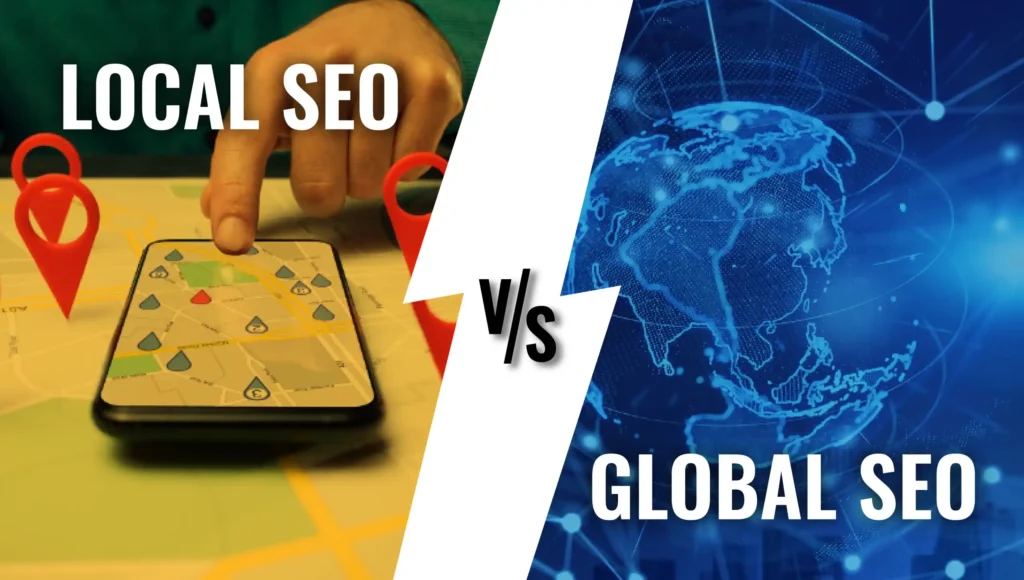Local vs Global SEO: The Differences and Uses
Search engine optimization is probably one of the most important aspects of online marketing. SEO strategies are not one-size-fits-all, though. Depending on your business goals, audience, and geography, you may need to concentrate on Local SEO or Global SEO. They are both immensely powerful tools in their own right, but they are designed for different purposes, and understanding the differences can go a long way toward developing a successful digital marketing plan.
Understanding the key differences between local SEO vs global SEO is essential for crafting an effective digital marketing strategy. In this blog, we will be comparing local SEO and global SEO in-depth to help you decide which approach is best according to your business goals. We’ll explore their definitions, strategies, benefits, challenges, and use cases that will give you the complete knowledge.
The choice between local SEO vs global SEO ultimately depends on your business type and objectives.
What is Local SEO?
Local SEO usually refers to the search engine optimization strategies focused on improving visibility in local search results. Local SEO is used by businesses that target customers in a specific geographic area (such as a city or region) to be found at the top of localized searches.
Key Components of Local SEO:
- Google My Business (GMB): Make sure to provide accurate and complete information. This includes accurate business information such as their address, phone number, hours of operation, and customer reviews.
- Geographic Keywords: Accessibility of participation in local searches through the use of relevant keywords (e.g., best coffee in New York).
- NAP Consistency: NAP is an acronym for name-address-phone number of the business; to maintain this consistency increases your credibility as an offline business.
- Local Citations: Listings on local directories like Yelp, Foursquare, and other nation-based local sites to enhance visibility and authority.
- Reviews: Google, Yelp, and other review sites need good customer reviews to rank higher in local searches.
Benefits of Local SEO:
- Improves visibility to local customers.
- Increases chances of showing in “near me” & map searches
- When it comes to the relationship between digital and physical stores, digital can drive more foot traffic into physical stores.
- Develops trust with positive customer reviews.
- Promotes local community involvement.
Use Cases for Local SEO:
- Restaurants and cafes.
- Local service providers (plumbers, electricians, real estate agents, etc.).
- Physical retail stores.
- Healthcare providers, including clinics and dental offices.
What is Global SEO?
Global SEO: On the other hand, global SEO is all about optimizing a website to rank well in the global search results (with the target of a wider international perspective). Global SEO strategies are typically more valuable for businesses with international presence or companies that sell products/services online.
Key Components of Global SEO:
- General Keywords: Focusing on common, generic, non-geographical keywords that have a high search volume.
- Multilingual and Multiregional SEO: Writing content in different languages and localizing content for various areas.
- Localization of Content: Tailoring content to fit the cultural and linguistic preferences of target markets.
- Global high-quality off-page backlinks: Links from high-authority global websites
- Scalability: Making sure that websites are able to deal with traffic and demands from audiences across the globe.
Benefits of Global SEO:
- Establishes brand identity in global markets
- Offers traffic at scale, which thus means more opportunity for increased revenue.
- Assists global businesses or businesses selling online internationally
- Competed better in an international environment.
Use Cases for Global SEO:
- An e-commerce company that can ship internationally.
- SaaS companies serving international users
- Multinational corporations.
- Content platforms targeting a global audience.
Applying Local SEO Strategies
A bakery in Boston with a local focus will:
- Claim its Google My Business profile and ensure it’s up to date with accurate location and contact details.
- Include geo-targeted terms such as “Boston artisan bakery” throughout its site.
- Collecting Google and Yelp reviews builds trust with customers.
- Write search semantics for ”best dessert seats in Boston.”
These measures are helping the bakery connect with customers in their immediate vicinity.
The Challenges of Local and Global SEO
Challenges of Local SEO:
- Limited Reach Display Ad: Local SEO is, by nature, limited to a local area that can restrict growth potential.
- Intense Local Competition: Difficulties in ranking may arise from other competing local businesses targeting the same audience.
- Reliant on Reviews: Local rankings and customer trust can be greatly affected by negative reviews.
Challenges of Global SEO:
- Language Loss in Translation: Misaligned translations or cultural nuances can alienate users.
- Strong Competition: Competes with well-established, huge global brands.
- Increased Expenses: An international and multilanguage strategy entails considerable cost.
How To Decide When It’s Local SEO Vs Global SEO
When deciding on the two strategies, consider these questions:
What is your main target audience?
- If your customers are mostly in one area, then you should pursue local SEO.
- If you’re intending to service customers in multiple countries, global SEO is more suitable.
What are the key outcomes of your business?
- Local SEO is great for driving foot traffic and local activity.
- If you want to grow an international brand presence, global SEO is more appropriate.
What resources do you have?
- Local SEO services typically consume fewer resources yet still provide excellent results for smaller businesses.
- Having global SEO can be expensive related to content, translators, and technical SEO.
Can Local SEO and Global SEO be Further Combined?
For businesses that target both local and international markets, ensuring local and global SEO strategies at the same time can get you the best result possible. For a glimpse of this, a hotel chain can use global SEO to attract international tourists at the same time as using local SEO to reach residents looking for staycation options.
Hacks for Merging Both Strategies:
- Make regional landing pages for your worldwide audience.
- Create Google My Business profiles/logins for each branch/location.
- Use Local Keywords When Talking About Branch-Specific Offerings
- Create global work that has devoted local elements to reach distinct markets.
Final Thoughts
Both local SEO and global SEO target different objectives, and they are both valuable guns for companies that want to grow in these marketplaces. In this process of aligning your strategies to your business goals, you need to understand their differences, benefits, and use cases. Two prominent strategies—local SEO vs global SEO—differ significantly in their approach and focus.
The right SEO strategy can help you reach your audience, whether you are a small-town bookstore trying to draw in local residents or a multinational enterprise extending worldwide.
Now, if you’re prepared to take your online presence to the next level, assess your business’s requirements and implement SEO directed toward your unique goals.When deciding between local SEO vs global SEO, it’s essential to evaluate your business goals, target audience, and available resources.
FAQ
What is the difference between global SEO and local SEO?
Global SEO focuses on optimizing a website for a worldwide audience, targeting broad keywords and considering multilingual and cultural differences. Local SEO, however, is tailored to improve visibility within a specific geographic area, using localized keywords, Google My Business optimization, and location-specific strategies.
What is the difference between local and international SEO?
Local SEO targets audiences within specific regions, such as a city or neighborhood, focusing on location-based searches. International SEO is designed to attract users across multiple countries or languages, requiring strategies like multilingual content, hreflang tags, and region-specific optimization.
What is the difference between local SEO and SEO?
SEO encompasses all strategies to improve search engine visibility, regardless of location. Local SEO is a specialized subset that focuses on location-specific tactics to attract customers searching for nearby businesses or services.
What is the difference between local and global search?
Local search is geared toward finding services or businesses in a specific area, such as “coffee shop near me.” Global search focuses on broader queries that are not tied to any particular location, such as “best laptops in 2025.”
Is local SEO still relevant?
Local SEO remains highly relevant, especially for businesses seeking to attract nearby customers. With the increasing use of mobile devices and voice searches, optimizing for local SEO is crucial to appear in local search results, drive foot traffic, and boost conversions.


